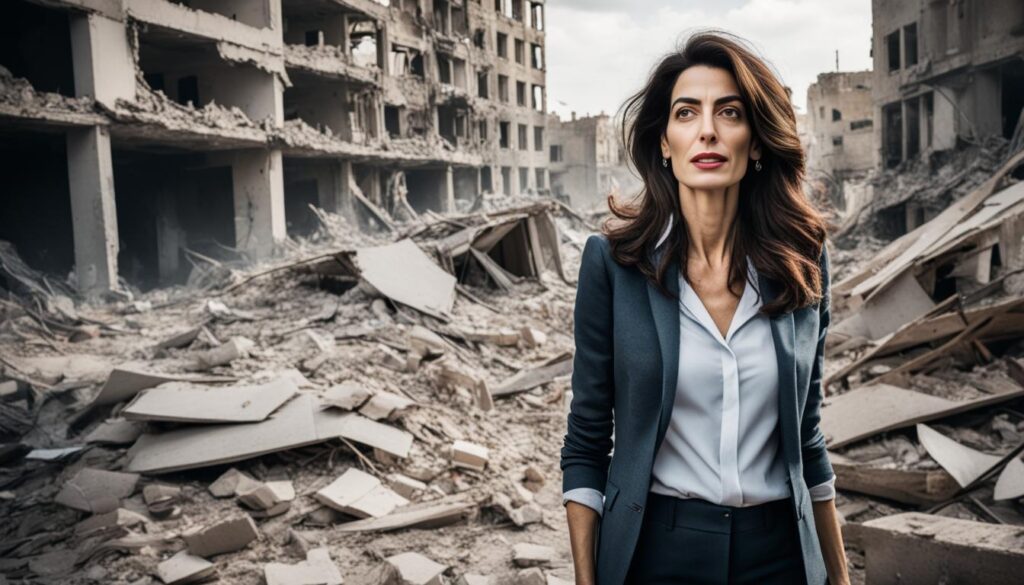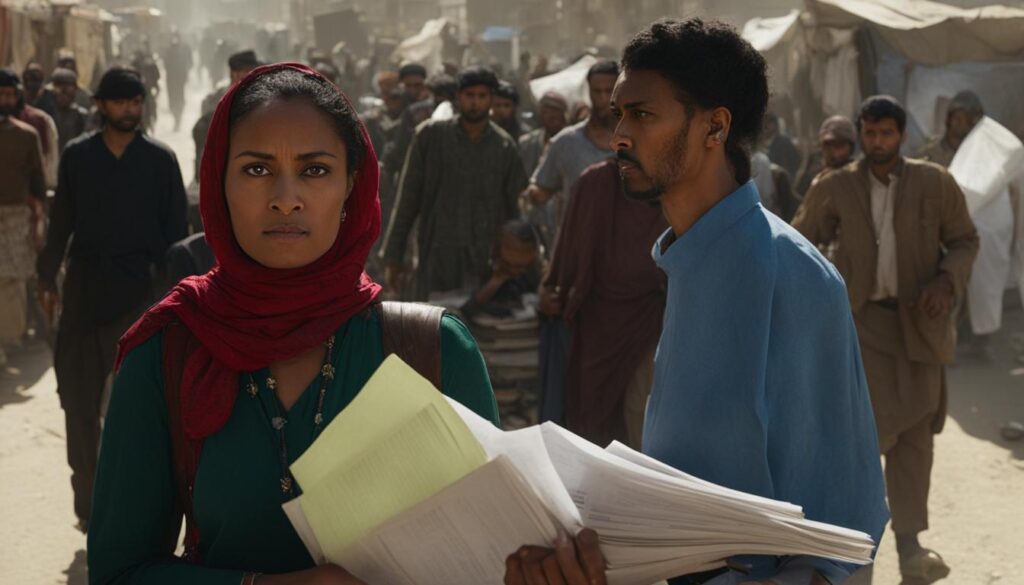A human rights lawyer is a dedicated advocate for civil liberties and the defense of fundamental rights. These legal professionals specialize in addressing issues such as discrimination based on sex, race, gender, and more. Their work is vital in ensuring justice and equal treatment for all individuals.
In this article, we highlight five top human rights lawyers who have made a significant impact in their field. From defending wrongful deaths in custody to challenging unfair sentencing and advocating for women’s rights, these lawyers are at the forefront of fighting for justice and promoting civil liberties.
Key Takeaways:
- Human rights lawyers are passionate advocates for civil liberties and fundamental rights.
- They tackle issues such as discrimination, unfair sentencing, and the protection of vulnerable individuals.
- Top human rights lawyers mentioned in this article include Julian Falconer, Bryan Stevenson, Amal Clooney, Fatou Bensouda, and Samantha Power.
- These lawyers have successfully fought for justice, challenged unjust laws, and made significant contributions to the field of human rights.
- Their work serves as an inspiration and a reminder of the importance of upholding the principles of justice and defending fundamental rights.
Julian Falconer
Julian Falconer, a Canadian lawyer, has built a successful career defending human rights. He is a prominent human rights lawyer known for his dedication and expertise in this field. Falconer is the founder of Falconer LLP, a law firm that specializes in human rights cases.
At Falconer LLP, Julian Falconer and his team have represented numerous individuals and groups in high-profile cases involving wrongful deaths in custody, unlawful arrests, and beatings of journalists at the G20 summit. They have also taken on cases relating to the detention and torture of Maher Arar, a Canadian citizen.
Julian Falconer’s commitment to human rights has been highly recognized, and he has received numerous awards for his exceptional work. Some of his notable accolades include the Urban Alliance Race Relations Medal and Pride News Magazine’s African Canadian Achievement Award.
Urban Alliance on Race Relations Medal
“Julian Falconer’s tireless advocacy for human rights and commitment to combating racial injustice have made a significant impact. His dedication to promoting equality and challenging systemic discrimination is truly inspiring.” – Urban Alliance on Race Relations
Pride News Magazine’s African Canadian Achievement Award
“Julian Falconer’s outstanding contributions to the field of human rights law have been exemplary. His work in defending the rights of marginalized communities has helped shape a more just and equitable society.” – Pride News Magazine
Julian Falconer’s work at Falconer LLP and his involvement with organizations such as the Urban Alliance on Race Relations have been instrumental in advancing human rights and advocating for justice in Canada.
| Notable Cases | Awards and Recognition |
|---|---|
|
|
Bryan Stevenson

Bryan Stevenson is a renowned human rights lawyer and the founder of the Equal Justice Initiative. His unwavering commitment to challenging the prison system and advocating for fair treatment has earned him international recognition.
Stevenson’s work primarily focuses on addressing issues such as unfair sentencing, the plight of innocent individuals on death row, the abuse of prisoners and the mentally ill, and the unjust prosecution of children as adults. Through his tireless efforts, Stevenson and his team have achieved several significant victories in their fight for justice.
Protecting the Vulnerable
One of the groundbreaking victories of the Equal Justice Initiative led by Bryan Stevenson is the ban on life-imprisonment-without-parole sentences for children under the age of 18. This achievement acknowledges the need for age-appropriate sentencing and rehabilitative opportunities for young offenders, highlighting the importance of second chances and rehabilitation.
Furthermore, Stevenson’s work has also resulted in the protection of condemned prisoners with dementia. By advocating for fair treatment and recognizing the specific vulnerabilities faced by individuals with cognitive impairments, Stevenson has made strides in ensuring that all prisoners are treated with dignity and compassion, regardless of their circumstances.
Transforming the Justice System
Bryan Stevenson’s efforts have not only impacted individual cases, but they have also contributed to larger systemic changes. His work has shed light on the pervasive issues within the criminal justice system, sparking conversations and discussions that are essential for reform.
Through the Equal Justice Initiative, Stevenson has challenged unfair sentencing practices, systemic racism within the legal system, and discriminatory practices against marginalized individuals. By fighting for equal justice under the law, he strives to create a more just and equitable society for all.
“Each of us is more than the worst thing we’ve ever done.”
Stevenson’s powerful quote reminds us of the inherent value and dignity of every individual, regardless of their past mistakes. It serves as a reminder that even those who have committed grave offenses deserve fair treatment and the opportunity for redemption.
To learn more about Bryan Stevenson and the work of the Equal Justice Initiative, visit their official website.
Amal Clooney

Amal Clooney, a renowned human rights lawyer, has made a significant impact in her field. She has represented clients before international courts and has worked on cases involving the recognition of the Armenian Genocide, corruption by Azerbaijan’s president, and the sex slavery of an Iraqi student by ISIS.
Clooney is a strong advocate for women’s health and human rights, and she co-founded the Clooney Foundation for Justice to support survivors of war, provide education to vulnerable children, and assist refugees.
Representing Justice on the International Stage
Amal Clooney’s expertise in international law has allowed her to navigate complex legal landscapes and advocate for justice on a global scale. Through her work, she has shed light on the atrocities committed during times of war and played a crucial role in holding perpetrators accountable for their actions.
In the Cambodia Genocide Trial, Clooney represented one of the survivors of the Khmer Rouge regime, fighting for recognition and justice for the millions who lost their lives. She successfully argued for the conviction of the regime’s top leaders, bringing closure to the victims and ensuring that their stories would not be forgotten.
Furthermore, Clooney took on the case of Nadia Murad, a Yazidi woman who endured unimaginable suffering under ISIS captivity. With Clooney’s representation, Murad obtained a seat at the United Nations, where she shared her harrowing story and advocated for international action against sexual violence during war. Her courageous testimony sparked global awareness and drew attention to the urgent need for justice.
“We must not only remember the victims but also address the root causes of sexual violence, hold the perpetrators accountable, and provide support to survivors.”
– Amal Clooney
Clooney’s relentless pursuit of justice has made significant strides in combating sexual violence and protecting the rights of survivors. Her work has influenced international policies and initiatives, placing sexual violence during war at the forefront of the global agenda.
Co-Founder of The Clooney Foundation for Justice
Recognizing the need for comprehensive support and rebuilding efforts, Amal Clooney co-founded the Clooney Foundation for Justice. This organization focuses on providing assistance to survivors of war, advocating for the rights of marginalized communities, and promoting the importance of education in conflict zones.
The Impact of Amal Clooney’s Work
Amal Clooney’s dedication to human rights and international law has made a profound impact on the lives of countless individuals affected by conflict and injustice. Through her high-profile cases and influential advocacy, she continues to fight for a more just and equal world.
As a human rights lawyer, Clooney embodies the power of the legal profession to effect change and protect the most vulnerable. Her work serves as an inspiration to future generations of lawyers and reminds us of the importance of upholding the principles of international law and defending human rights.
Fatou Bensouda

Fatou Bensouda is an esteemed human rights lawyer who currently holds the position of chief prosecutor at the International Criminal Court (ICC). Her notable work in the field of human rights has earned her recognition and awards both nationally and internationally. Originally from Gambia, Bensouda has been steadfast in her commitment to uphold justice and ensure the protection of fundamental rights.
At the ICC, Bensouda is responsible for investigating and prosecuting individuals accused of carrying out war crimes, crimes against humanity, and genocide. Her tireless efforts have played a vital role in holding perpetrators accountable and seeking justice for victims.
Despite her significant contributions, Bensouda has faced opposition in her pursuit of justice. One example of this is the revocation of her visa by the United States. This action was taken in response to Bensouda’s ongoing investigation into possible war crimes committed by US forces in Afghanistan. Despite the challenges she has faced, Bensouda remains steadfast in her commitment to upholding human rights and seeking accountability for crimes committed during armed conflicts.
Throughout her career, Fatou Bensouda has demonstrated unwavering dedication and a deep understanding of the importance of human rights. Her work serves as a testament to the critical role human rights lawyers play in addressing and preventing human rights abuses.
It is important to recognize and support the efforts of individuals like Fatou Bensouda, who tirelessly work towards a world where justice and human rights are upheld for all.
| Contributions | Awards and Recognition |
|---|---|
| Fighting for accountability in cases of war crimes. | Recipient of the International Nuremberg Human Rights Award. |
| Working towards justice for victims of crimes against humanity. | Awarded the Hessian Peace Prize for her efforts in international criminal law. |
| Advocating for the protection of fundamental rights on a global scale. | Recipient of the Geuzen Medal, awarded for outstanding efforts in the field of human rights. |
Samantha Power

Samantha Power is a notable figure in the field of human rights, having embarked on her career as a war correspondent during the tumultuous Yugoslav Wars. Inspired by the profound impact of witnessing conflict firsthand, she transitioned to become a human rights lawyer, driven by a commitment to combatting human rights violations and promoting justice.
Power’s work extends beyond the courtroom. During Barack Obama’s presidency, she served as the chair of the Atrocities Prevention Board, a position where she played a pivotal role in drawing attention to the crisis in Darfur and advocated for the prevention of genocide and other atrocities globally.
Her dedication to human rights advocacy led to her appointment as the United States Ambassador to the United Nations. In this esteemed role, Power represented the U.S. on the international stage, working towards the protection and promotion of human rights worldwide.
Recognized for her unwavering commitment to justice, Samantha Power has left an indelible mark in the fields of human rights law, international diplomacy, and conflict prevention.
“We owe our children more than we have given them; I think this is meant not only for our own progeny but also for children around the world who long for camaraderie, compassion, and ethical leadership.”
Key Contributions:
- Transitioned from war correspondent to human rights lawyer
- Chaired the Atrocities Prevention Board during Barack Obama’s presidency
- Advocated for the prevention of genocide and other atrocities
- Served as the United States Ambassador to the United Nations
Kimberley Motley

Kimberley Motley is a remarkable human rights lawyer who has gained international recognition for her groundbreaking legal work, particularly in Afghanistan. As the first foreign lawyer to practice law in Afghanistan, Motley has made history and played a pivotal role in promoting justice and defending civil rights in the country.
Motley’s fearless pursuit of justice has led her to take on high-profile cases that have captivated the world’s attention. Her dedication to seeking truth and advocating for the most vulnerable has helped her achieve significant victories in the courtroom.
“I believe in the power of the law to create meaningful change and give a voice to those who have been silenced.”
Making a Difference: High-Profile Cases
Motley has taken on complex and challenging cases that have tested her legal expertise and determination. One of her notable achievements was successfully representing a former Australian soldier who was wrongfully detained in Afghanistan. This case not only highlighted the importance of due process and fair treatment for all individuals, but it also shed light on the issue of wrongful imprisonment in conflict zones.
An equally significant case involved Motley’s efforts to reunite abducted children with their families. Her relentless pursuit of justice led to the successful repatriation of these innocent children, providing hope and solace to grieving parents and revealing the power of legal advocacy.
In addition to her high-profile cases, Motley has been a vocal advocate for human rights in Afghanistan. Through her legal work, she has sought to address systemic issues and advocate for reforms that will protect the rights and dignity of all individuals within the country.
Table 7: Kimberley Motley’s Impactful Cases
| Case | Outcome |
|---|---|
| Representation of a former Australian soldier | Successful release and return to Australia |
| Efforts to reunite abducted children | Successful repatriation to their home country |
Kimberley Motley’s work as a human rights lawyer in Afghanistan has left an indelible mark, not only on the legal landscape but also on the lives of countless individuals. Her unwavering commitment to justice and her ability to challenge the status quo have made her a beacon of hope for those who have been marginalized and silenced.
Through her groundbreaking legal victories and tireless advocacy, Motley continues to inspire others to fight for justice, defend civil rights, and break down barriers wherever they may exist.
Adam Wagner

Adam Wagner is a highly respected human rights lawyer who has dedicated his career to advocating for justice and promoting human rights in multiple areas of law. With his extensive expertise in public law, human rights, prison law, and immigration, Wagner has become a leading authority in the field.
His vast knowledge and experience have allowed him to act at all levels, including arguing cases before the esteemed Supreme Court and the European Court of Human Rights. Wagner’s ability to navigate complex legal issues and present compelling arguments has earned him a strong reputation among his peers.
Wagner’s commitment to human rights advocacy is further emphasized through his involvement in major public inquiries, where he works diligently to uncover truths, seek justice, and drive meaningful change. His contributions to these inquiries have shed light on critical issues and resulted in significant legal reforms.
In addition to his legal practice, Adam Wagner has founded the human rights charity RightsInfo, which aims to educate and inform the public about their rights under the law. Through RightsInfo, Wagner is able to reach a broader audience, raise awareness about human rights issues, and empower individuals to stand up for their rights.
Expertise in Multiple Areas of Law
Adam Wagner’s expertise extends beyond human rights law. He possesses a deep understanding of various legal disciplines, enhancing his ability to approach cases from different angles and provide comprehensive legal representation to his clients. His expertise includes:
- Public law: Wagner excels in navigating the complexities of public law and utilizing legal mechanisms to hold public authorities accountable.
- Prison law: With his knowledge of prison law, Wagner advocates for the rights and dignity of prisoners, ensuring they are treated fairly and justly.
- Immigration law: Wagner assists individuals navigating the complexities of immigration law, providing guidance and advocacy to protect their rights.
Adam Wagner’s multidisciplinary expertise sets him apart as a versatile and highly sought-after attorney, capable of addressing complex legal challenges with a comprehensive approach.
Through his unwavering dedication and exceptional legal skills, Adam Wagner continues to make a significant impact in the field of human rights law, championing justice and defending the rights of individuals and communities.
Hilary Stauffer

Hilary Stauffer is an international lawyer with extensive experience working on projects around the world. Her areas of expertise include international law, human rights, humanitarian affairs, and diplomacy. Stauffer has held various roles in the diplomatic, NGO, and legal sectors, advocating for international humanitarian law, accountability, business and human rights, and democracy promotion.
Notable Achievements
- Contributed to the development of international treaties and agreements to protect human rights and promote democracy.
- Provided legal counsel and representation for individuals and organizations working in conflict zones.
- Collaborated with international organizations to investigate and document human rights violations.
- Served as a legal advisor in peace negotiations and reconciliation processes.
“Every person deserves to live in a world where their rights are protected and their voices are heard. As an international lawyer, it is my mission to fight for justice, uphold the principles of international law, and advocate for the rights of all individuals.”
Stauffer’s dedication to promoting human rights and democracy has made a significant impact on the global stage. Through her expertise in international law and her commitment to justice, she has played a vital role in advancing the cause of human rights and ensuring accountability for human rights abuses.
Cherie Blair

Cherie Blair is a highly respected human rights lawyer with a focus on international arbitration and women’s rights advocacy. With over 40 years of experience as a barrister, she has represented governments and multinational corporations in international disputes.
Blair’s expertise in international arbitration has made her a sought-after legal professional, known for her ability to navigate complex legal frameworks and find fair resolutions for her clients.
In addition to her work in international law, Blair is also a passionate advocate for women’s rights. She has been involved with various charities and foundations, including the Cherie Blair Foundation for Women, which supports female entrepreneurs in the developing world.
Cherie Blair’s dedication to protecting human rights and promoting gender equality has made her a prominent figure in the legal community.
Through her legal expertise and advocacy work, Cherie Blair continues to make significant contributions to the field of human rights law and the advancement of women’s rights around the globe.
Key Accomplishments:
- Represented governments and multinational corporations in international disputes
- Advocated for women’s rights and supported female entrepreneurs through the Cherie Blair Foundation for Women
How to Become a Human Rights Lawyer
Conclusion
Human rights lawyers are essential champions of justice, defenders of civil liberties, and guardians of fundamental rights. The exceptional human rights lawyers featured in this article have left a lasting impact in their respective fields, tirelessly fighting against discrimination, challenging unjust laws, and tirelessly working to ensure equal treatment for all. Their unwavering dedication to upholding human rights serves as an inspiration that reminds us of the utmost importance of defending the principles of justice and equality.
With their expertise, passion, and commitment, these lawyers have made significant strides in advocating for the rights of individuals and marginalized communities. Through their tireless efforts, they have paved the way for groundbreaking legal victories, shedding light on human rights abuses, and establishing crucial precedents that protect and uphold civil liberties. Their work stands as a testament to the power of law as a force for positive change.
As we reflect on the achievements of these remarkable attorneys, we are reminded of the ongoing struggle for justice and the need for continued support for the work of human rights lawyers. Their dedication to defending fundamental rights encourages us all to stand up against injustice, fight for equality, and work towards a more just and inclusive society. By recognizing and supporting the vital role of human rights lawyers, we can collectively contribute to the advancement of justice and the protection of civil liberties for all.
FAQ
Q: How can I become a human rights lawyer?
A: To become a human rights lawyer, you typically need to complete a bachelor’s degree, attend law school to earn a Juris Doctor (J.D.) degree, pass the bar exam, gain relevant experience through internships or clinics, and focus on human rights courses and extracurricular activities.
Q: What do human rights lawyers do?
A: Human rights lawyers work to protect and promote basic rights and freedoms, represent victims of human rights violations, provide legal advice and representation, draft legal documents, participate in legal cases related to human dignity, and may also work with non-governmental organizations or international human rights bodies.
Q: What is the average salary of a human rights lawyer?
A: The average salary of a human rights lawyer may vary depending on factors such as experience, location, and the type of organization they work for. Generally, human rights lawyers can expect to earn a salary comparable to other legal professions.
Q: What qualifications do human rights lawyers need?
A: Human rights lawyers need to have a Juris Doctor (J.D.) degree, pass the bar exam in their jurisdiction, demonstrate a strong commitment to human rights work, and may also need to complete relevant internships or clinics to gain practical experience in the field.
Q: What are some career paths for human rights lawyers?
A: Human rights lawyers can pursue careers in non-governmental organizations, international human rights bodies, legal clinics, government agencies, or private firms that specialize in human rights law. They may also engage in pro bono work to provide legal assistance to marginalized or vulnerable populations.
Q: How is the job outlook for human rights lawyers?
A: The job outlook for human rights lawyers is generally positive, with opportunities available in various sectors such as advocacy, policy-making, litigation, research, and academia. As awareness of human rights issues continues to grow globally, the demand for qualified human rights lawyers is expected to increase.
Q: What are some common gender rights jobs for human rights lawyers?
A: Common gender rights jobs for human rights lawyers include working for organizations that focus on women’s rights, LGBTQ+ rights, gender equality, reproductive rights, and combating gender-based violence. Human rights lawyers in this field often advocate for the protection and advancement of gender rights through legal means.
Q: What does a human rights lawyer do?
A: Human rights lawyers work to protect and promote the fundamental rights of individuals, ensuring they are not violated by governments, organizations, or individuals.
Q: How can I become a human rights lawyer?
A: To become a human rights lawyer, you typically need to attend law school, pass the bar exam, and specialize in human rights law through internships, clinics, or extracurricular activities.
Q: What is the average salary of a human rights lawyer?
A: The average salary of a human rights lawyer may vary depending on factors such as location, experience, and the type of organization they work for. However, human rights lawyers often earn competitive salaries.
Q: What educational qualifications do human rights lawyers need?
A: Human rights lawyers usually need a law degree (Juris Doctor), passing the bar exam, and acquiring knowledge in human rights legislation and international human rights to practice in the field effectively.
Q: What are the career paths for human rights lawyers?
A: Human rights lawyers can pursue various career paths including working for non-governmental organizations, humanitarian organizations, legal clinics, government agencies, or private firms specializing in human rights law.
Q: What is the job outlook for human rights lawyers?
A: The job outlook for human rights lawyers is promising as the demand for legal professionals who can advocate for human rights, equality, and civil rights continues to grow globally.
Q: Is there a short guide on how to become a human rights lawyer?
A: Yes, there are resources available that provide a short guide on steps to become a human rights lawyer, including advice on law school admissions tests, internships, job opportunities, and practical skills development.




